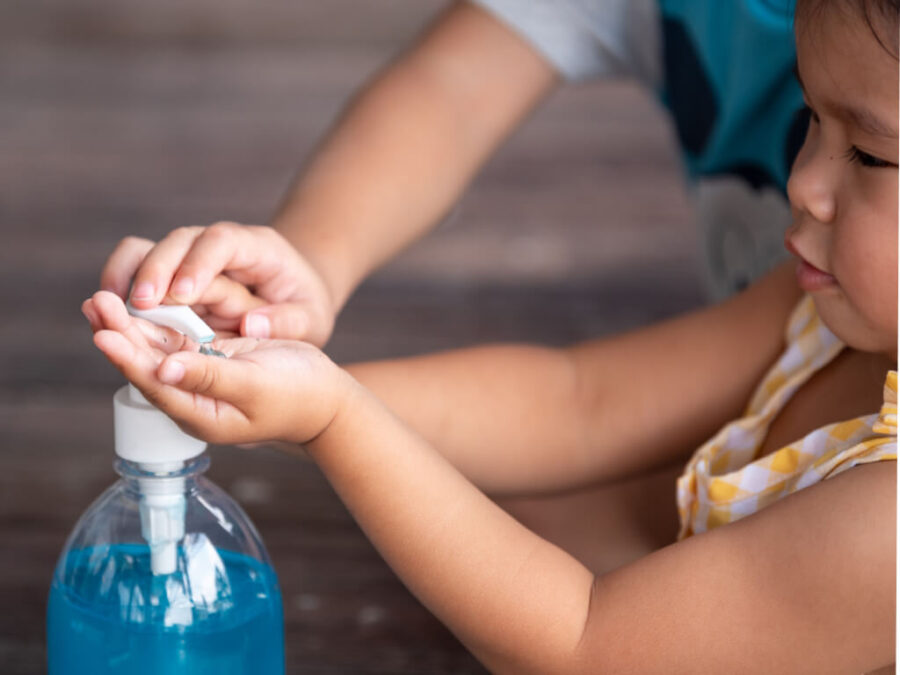Imagine discovering that your five-year-old child has been drinking half a standard-strength beer every day for the last three months.
Now, what if you learned that this wasn’t from actually drinking alcohol, but from something as seemingly harmless as sanitising their hands?
Alarmingly, this is the amount of alcohol a child may absorb through their skin if sanitising their hands ten times a day with a WHO recommended formulation.
This alcohol exposure can have serious consequences, potentially impacting liver function, brain development, and overall health.
Vera’s hand sanitisers provide the same level of germ protection—but without alcohol. That means no risk of absorption, no toxic effects, and no danger to people especially those who are vulnerable to alcohol exposure.

Alcohol-Based Sanitiser Risks
While hand sanitisation is now a part of daily life, alcohol-based sanitisers come with serious downsides that many people are unaware of. From health risks to fire hazards, here’s why they may not be the best option:
1. A Hidden Danger to Those in Recovery
For recovering alcoholics or drug addicts, even a small amount of alcohol entering the bloodstream through the skin can trigger a metabolic cascade, potentially leading to relapse. This means that something as simple as using an alcohol-based sanitiser could have devastating consequences for those trying to maintain sobriety.
2. Worsening Skin Conditions and Open Wounds
Anyone suffering from eczema, dermatitis, psoriasis, or even minor cuts knows the stinging pain of alcohol on broken skin. Beyond discomfort, alcohol-based sanitisers can cause further irritation and even increase alcohol absorption into the bloodstream (Source: NIH).
3. Dangerous Drug Interactions
Statistics show one in three Australians take medication daily. Many common drugs lose effectiveness or cause dangerous side effects when combined with alcohol. These include:
- Antibiotics
- Antidepressants
- Pain relievers
- Cholesterol and blood pressure medications
- ADHD treatments
With alcohol-based sanitisers, users may be unknowingly compromising their medication’s effectiveness—or worse, increasing their risk of adverse reactions.
4. A Fire Hazard in Disguise
Laboratory tests show that alcohol-based hand gels can ignite in the presence of a flame or high temperatures, posing a serious fire risk. Whether at home, at work, or in high-risk environments like kitchens or workshops, this is a hazard that is often overlooked.
Why Vera is the Smarter Choice
Vera’s range of hand sanitisers and cleaning formulations are designed with safety, effectiveness, and sustainability in mind. Unlike alcohol-based products, Vera is alcohol and ethanol free and non-flammable – No risk of absorption, toxicity, or relapse triggers. Vera is also non-toxic and gentle on sensitive skin, making them a safe alternative for everyone—including those with skin conditions.
✅ Safe for children – No harmful side effects.
✅ Non-irritating – Gentle on sensitive skin, even with frequent use.
✅ No adverse reactions – No interference with prescription drugs.
✅ Non-flammable – No risk of fires or explosions.
Cleanliness shouldn’t come at the cost of your health or safety. With Vera, you can protect yourself and your loved ones without compromise.

Use Vera for Everyday Cleanliness
Hand hygiene is essential—but how you sanitise matters. While alcohol-based sanitisers have been widely used, their risks are too significant to ignore.
Vera offers a safer, smarter, and more responsible alternative—without sacrificing effectiveness. Whether for yourself, your children, or those around you, choosing Vera means choosing protection without the risks.
Make the switch today and experience a truly safe, effective way to maintain healthy hygiene.

